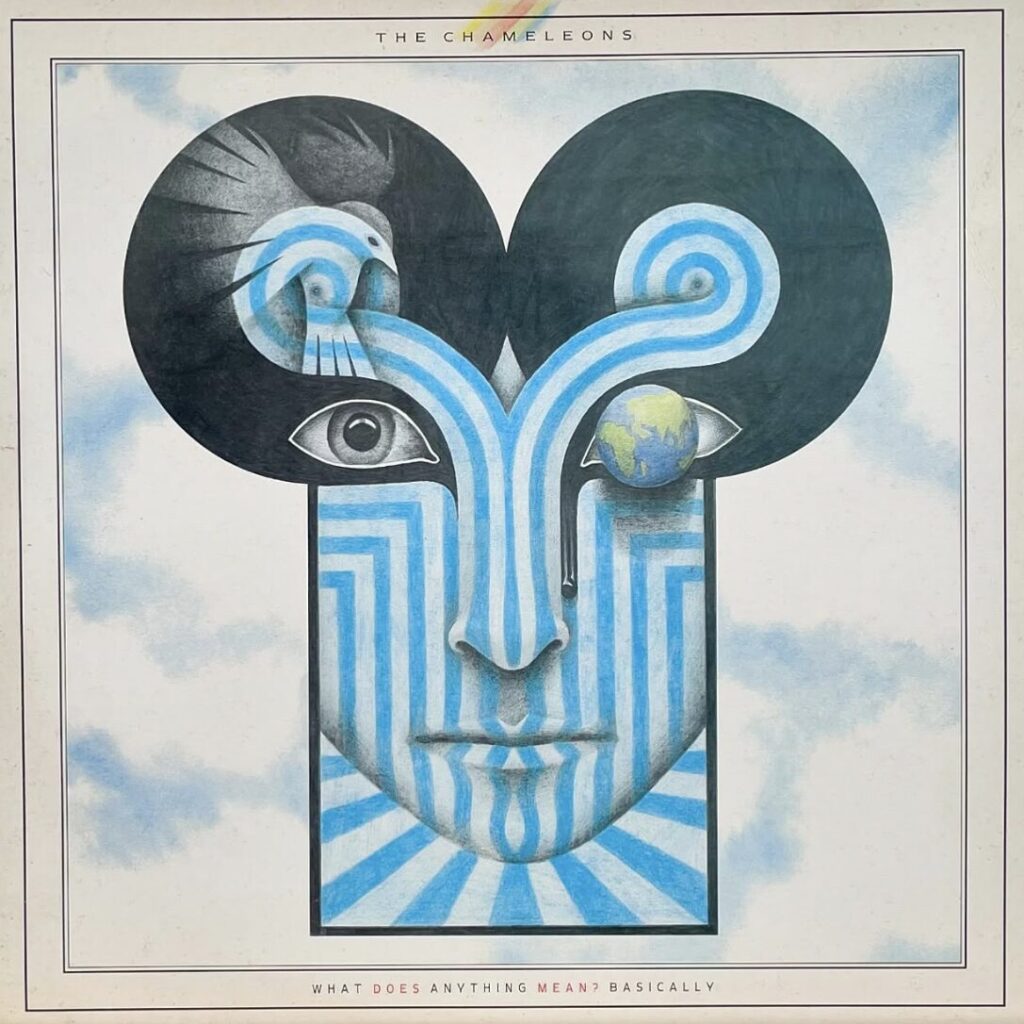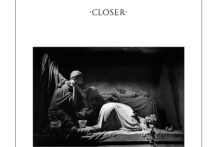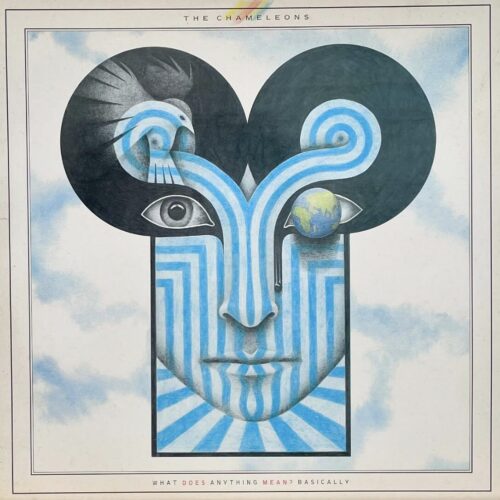It’s been 40 years since The Chameleons released What Does Anything Mean? Basically. Currently playing on my laptop, remastered in crisp HD 1440p, their frontman Mark Burgess is belting out the final refrain of ‘Singing Rule Brittania’. It’s 1984, the year before the album was released, and The Chameleons are playing live at Camden Palace, following the release of the album they are best known for, Script Of The Bridge. Four brooding Manchester lads in skinny jeans look cool as ever. Burgess sounds exactly like he does on record, playing a cutting, grinding bass that’s slung low, bearing a fading peace sticker. I stare in transfixion as Burgess sings:
“Playing with the future in innocent bliss,
What a suffocating state to be,
But what a fascinating thing to see”
I close my laptop. What Does Anything Mean? Basically is scrawled across my worldview. The vaguely menacing outline of the LinkedIn EasyApply logo haunts every surface I look at. I’m calculating the odds of Putin nuking the whole of Europe before I own a house, when a thought occurs to me. The obvious parallel to draw is that the reality facing me and other friends born this century, probably isn’t so far from Burgess’ take on 1980s Britain.
Among some of the people we would now call post punk fans, Script Of The Bridge quickly became a cult favourite, and matching it would be no mean feat. The thrashy, overdriven guitars of ‘Don’t Fall ‘and ‘Up The Down Escalator’ hallmarked the excitement among musicians in a blossoming age for new and improved analogue guitar pedals, and the paranoid dissociation of ‘Second Skin’ spoke to the weird anxiety of its time. The record was powerful, rife with angst and urgency. With What Does Anything Mean? Basically The Chameleons would delve into more ambient, quietly existential sonic territory. Dismissed by some critics then as “overproduced” and after the fact as the “weakest of the original three albums”, many now admit giving it short shrift. (Although its bizarre, disjointed album cover probably didn’t help.)
That same year, Manchester’s own New Order released Low-Life, defining postmodern apathy for decades. What Does… fell to the wayside. Nevertheless, while it might not get talked about enough, it’s a record that deserves just as much acclaim. Its soundscapes and acerbic lyricism drip with a melancholia that’s as true to 80s Thatcher-era Britain as it is to 2025. Their third album, and last of their original run Strange Times, contained the hypnotic ‘Swamp Thing’ which was as close as they ever got to a commercial hit while still falling short of the mark. With a booming, wistful sound as deserving of the big stages as Joy Division and Echo And The Bunnymen, why did The Chameleons end up an obscurity; Manchester’s best-kept secret, who are often described along the lines of “post punk’s most influential lost band”?
Emerging from a hard done by Manchester in the 80s, the northern heartland of Britain’s post punk scene, The Chameleons were far from alone in their dismay at the social, cultural and political landscape of the late 70s and early 80s. Leeds’ Gang Of Four were one of many who had shaped the early post punk blueprint before the genre even had a name, combining it with the urgency of late 1960s counterculture, steeped in carefully studied left-wing politics. Killing Joke’s Jaz Coleman arrived with a much more apocalyptic, eschatological reaction to industrial decline and the birth pangs of neoliberalism. But even they originally arrived with the idea that ‘change’ was possible. Punk funk agitprop group turned new pop sensations Scritti Politti may have been a major label proposition who charted internationally but they were similarly anti-establishment and informed by critical theory. On one level or another, however, no matter how different they sounded, all of these groups originally arrived with the same idea: that a better future could be achieved by some form of radical social shift whether by the adoption of communism or anarcho-syndicalism. There was always a glimmer of hope.
In contrast, the pessimism of What Does Anything Mean? Basically was too bleak for any kind of popular appeal. A world-weary wistfulness was always at the heart of The Chameleons’ music, and this was combined with a renunciation of the sense of defiance exhibited on Script Of The Bridge. It was a complete surrender to the disillusionment that had long shadowed their sound. The following year’s Strange Times would explore this tortured complexity to an even fuller degree. It’s this emotional fatigue that resonates most deeply; the sense that it’s okay to just be tired of it all.
‘Return Of The Roughnecks’ recalled the thrashy punk zeal of Script Of The Bridge with its thunderous drums and Burgess’ cathartic screams, while also raising its arms in surrender. It was forthright with its rebellious disdain for “a faster future for a faster breed”, while carrying a vulnerability and helplessness that feels increasingly relevant today. Burgess spits: “When you try to drink, there’s someone pissing in the water.” It’s grimly prophetic, but it tells it like it is. Perhaps the Water Special Measures Bill will finally address the now very literal problem with excreta in our drinking supply today?
‘Perfume Garden’ is easily the best-known track off the record, and does, admittedly, counter What Does‘ negative image to a certain degree. It contemplates the desperate nostalgia for a bedtime lullaby, while also suggesting that all’s not lost. Its somewhat playful melody is oddly fitting – the song feels like the liminal space between being a teenager and a fully grown adult. The couplet I find the most devastating – “A pretty promise to teach a tender child, to welcome madness every Monday” – doesn’t just mourn innocence. It trains us to expect disorder. This take on Mondays really is haunting, but the song doesn’t let you wallow; Burgess sings of laughing with a friend from school, learning how to handle life’s fears as he goes along, befriending the chaos. For me, ‘Perfume Garden’ is an anthem for the little victories, a toolbox I can tap into whenever the going gets tough.
Commercially, Joy Division’s introspective angst and New Order’s synth pop accessibility might have made them more attractive. The former was less concerned with social disenfranchisement and more with internalised conflict, breaking new ground in left field rock music which would be studied by many others for decades to come. As for New Order’s Low-Life, the album which overshadowed What Does; the reflections it contains on nights out, such as ‘Sunrise’ and ‘The Perfect Kiss’, augured the changing nature of Britain’s ever burgeoning club culture. Perhaps it was the rumination on these tangible and joyful experiences that made them so much more relatable. At the end of the 1980s the compilation Substance fully cemented New Order fully within the canon, but even half way through the decade their experimentalism, defined by Roland drum machines and epic synth sequences, already seemed worlds apart from The Chameleons’ sweeping, atmospheric propensities.
Maybe people didn’t understand what The Chameleons were doing at the time – or they did and found it too close to the bone – but if you want a record that resonates in 2025, What Does might just be it. Burgess’ lyrics capture a sense of disillusionment, confusion, and quiet dread that feel eerily familiar today. I discovered The Chameleons because I’d left YouTube autoplay running while I was absentmindedly sorting through all of the books in my room. I let Script of the Bridge play out in full, and it felt so utterly familiar even though I knew I’d never heard this band before.
The four-piece had a dedicated cult following. Noel Gallagher’s tipped his hat to Strange Times, saying, “It must have influenced my early years as a songwriter because I can hear ME in it everywhere!” Across the pond, Interpol wore their early love for the band on their sleeve, and for those who know The Chameleons, the influence is obvious. One fan says that listening to Antics is like “crying without tears”, and it’s the same aching register that defines What Does. As the lists of similarly-influenced musicians grew, however, The Chameleons were further plunged into obscurity, though not without subtle nods in the years to come. In 2009, Birmingham-hailing Editors cited The Chameleons as one of the many bands that shaped their early dark and doleful sound.
Around 2019, a new wave of post punk-influenced bands was breaking onto the UK scene – the perfect soundtrack to my own late-night bike rides, as I rode deeper into the blissful ignorance of crippling student debt. South London’s Dry Cleaning – with their uncomfortable melodies, jangly vibrato-infused riffs, and Florence Shaw’s zoned-out spoken word – voiced a climate of political apathy. Shaw wrote the ethereal debut single ‘Magic Of Meghan’ after breaking up with a former partner and moving out of their apartment the same day that Meghan Markle and Prince Harry announced their engagement. The song celebrates the former while chastising the misogyny and racism inherent in the British establishment.
Most recently, Fontaines D.C. have produced a sound that suggests at least one member is a fan of The Chameleons. The Irish band’s 2024 LP, Romance, was a glittering prize that offered escape from the modern world, a refuge to cling to when everything else is crashing down. The mania-soaked ‘Starburster’, inspired by a panic attack frontman Grian Chatten once had on the tube, became an anthem for modern anxiety and solace in the “momentary blissness”. And four years earlier, the misleading apparent nihilism A Hero’s Death, arrived with explorations of loneliness and social media brainrot, arguing that life is sometimes empty, but not always.
Beyond the latest post punk revival, experimental pop pioneers Everything Everything broke new territory with their apocalyptic part-concept album Mountainhead in 2023. Frontman Jonathan Higgs indirectly echoed the bleak realism of The Chameleons when he told NME, “I can’t see much good in the future.” Sound familiar?
Fourty years after its release, What Does Anything Mean? Basically is less a relic of the past, and more a profound contemporary revelation. Sure, it might not have reached the critical acclaim of its peers, but it’s an underappreciated and eerily prescient body of work, a pocket of solace that resonates more powerfully today than it did in its own time. As I doomscroll into the early hours of a May morning, I think of the final, repeating lines of ‘Nostalgia’: “Tomorrow, I’ll remember yesterday.” It’s just the proverbial kiss on the forehead I’m looking for







